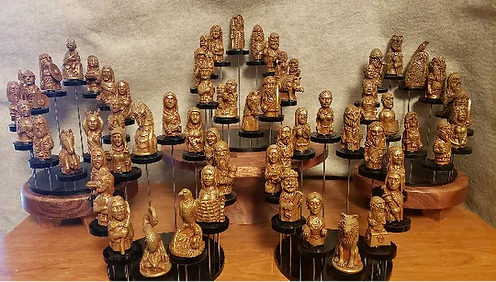Welcome to Aric Jorn Studios
I am a narrative artist whose mission is to explore, preserve and share Norse mythology and culture of the Viking Age. Through my sculptures, I seek to interpret the continued relevance of the culture and myths for a modern audience.
I invite you to be part of this mission by exploring and sharing this site, following the studio on Facebook and Instagram, participating in studio events, and, if you are inclined, supporting my work by purchasing a piece.

Two additions to the Viking Artifact Series
Hafgygr, the Bearded Axe and Skjaldarbani, the Dane Axe, have joined Herbliðr, the Viking sword and Úlfstönn, the Viking spearhead as the third and fourth pieces in the Viking Artifact Series.
Axes were traditional Viking weapons, with the beaded axe being the most iconic and the Dane axe being perhaps the most fearsome. Designed to stir the imagination, each of these limited-edition, signed and numbered pieces is sculpted to look like an artifact recently unearthed by archeologists. As these pieces adorn your wall, they appear like items on loan from a museum. Both axeheads are highly decorated and available with or without hand-gilded silver leafing.
To add a touch of the Viking Age to your home, order today.
Meet the latest Mini Myths to join the collection…
Featured Video:
Jackson Crawford Interview
Aric recently had the honor of being interviewed by Dr. Jackson Crawford, an expert in Old Norse language and mythology and the author of many books on the subject. Watch the interview in full here or on YouTube. If, after watching, you enjoy, please support Aric's work and that of Dr. Crawford, by giving it a thumbs up on YouTube.

One artist's journey of discovery through Norse art & Viking myth
I have loved mythology all my life and currently devote most of my artistic energies to sharing the stories told over 1000 years ago by the Vikings. Oddly, despite being Scandinavian, I grew up with little knowledge of my heritage or the depth, originality and richness of Norse mythology. When I began to explore it as an adult, I came to realize not only how captivating and uniquely satisfying their beliefs, traditions and stories were but also how much of it is gone. Like so many oral-based traditions of ages past, when ancient Scandinavia eventually succumbed to a different culture's beliefs - in this case, Christianity - most of this fascinating culture was forever lost to us. What remains are enticing fragments, curious artifacts, and tales of dubious provenance. As Neil Gaiman put it in his recent book, Norse Mythology, "I can imagine the stories but I cannot tell their tales ... they are lost, or buried, or forgotten."
Despite everything we've lost, much of what we know is highly accurate, particularly in the form of physical artifacts which offer clear examples of the Viking aesthetic as it manifested in their woodcarving, silversmithing, shipbuilding and the design of their weapons and armor as well as the textiles, burial rites and general structure of their society. But some of the things most closely associated with the Vikings turn out to be false or grossly altered to fit stereotypes. A handful of 19th century artists and composers including Richard Wagner are the likely source for the fallacy that Vikings had horns on their helmets. Some of the core source material used to study Norse mythology today was written a hundred or more years after the Viking Age had ended by people like Snorri Sturlason, author of the Prose Edda, who it is widely suspected revised the tales in order for them to be palatable to his largely Christian audience. Still more confusion has been stirred up through the borrowing of Viking mythology to create new tales (Marvel Comics, for instance, portrays the Aesir Gods as aliens from a distant planet). Even television series like History Channel's Vikings - for all they get right - portray the Norsemen in the black biker-leather-like-armor currently fashionable in movies when the reality of Viking dress was much more colorful and sophisticated.
I am not suggesting that there is anything wrong with using Norse mythology and culture as the basis or inspiration for new creative tales - the Vikings did this themselves after all and so do I. It is a rare and wonderful setting for artists to play in and expand upon, but as we play and borrow and delight in these stories - new and old alike - we should acknowledge that the resulting line between who the Vikings really were and who they have become in our collective imaginations is often a blurry one.
There is no way to know with any certainty whether my interpretation of a given character or story is entirely accurate and, as an artist, absolute accuracy is not always my main goal. Still, with every piece I create, I attempt to embody the spirit of my ancestors and interpret through my art the essence and meaning of the stories they left behind. I would like to think that the resulting work would be at least familiar to those who originated the tales over a millennium ago and that they would smile at me in recognition of a kindred spirit.
~Aric Jorn









